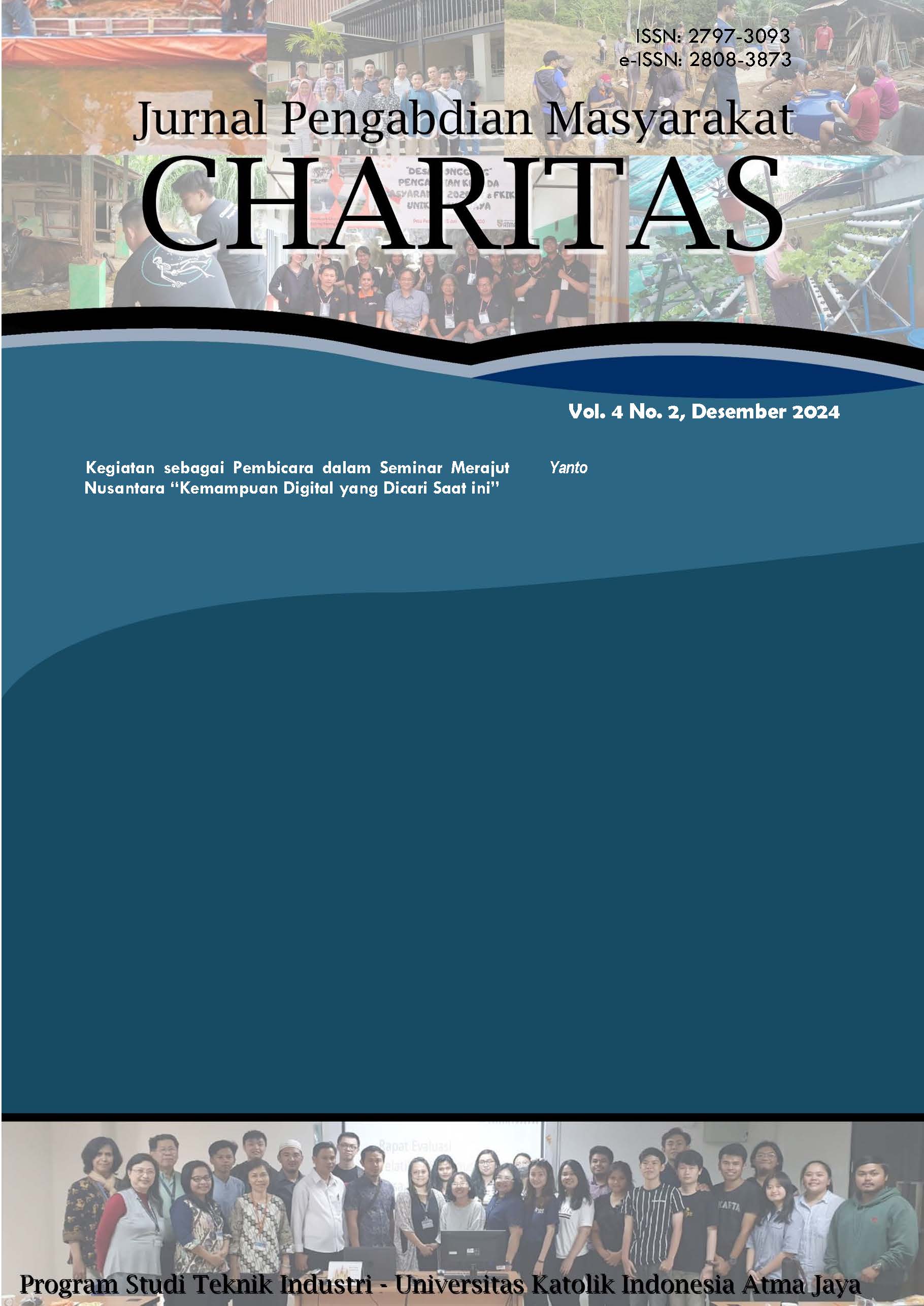Inisiasi AMIS Integrated Farming Melalui Kelompok Peternak Ayam Petelur Menuju Pertanian Berkelanjutan
DOI:
https://doi.org/10.25170/charitas.v4i02.5891Kata Kunci:
Global Climate Change, Zero Waste, Circular EconomyAbstrak
The existence of layer poultry farmer groups faces challenges in the era of global climate change. The rise in environmental temperatures significantly impacts agricultural and livestock activities. On the other hand, livestock farming generates a considerable amount of organic waste, which poses environmental concerns. The goal of the integrated farming system based on chickens, maggots, fish, and vegetables (AMIS) is to encourage resilient farmers to face global climate change, achieve zero waste agriculture and livestock farming, and establish a circular economy. The methods applied in the implementation of this program is socialization, training, and system application assistance. Participants from the Sumber Unggas Jaya Livestock Farmers Group were very enthusiastic about participating in every activity. This was demonstrated by their active involvement in each event and discussion. The participants also expressed interest in applying the AMIS system to their existing farming operations. This system can reduce organic waste pollution through the zero waste concept, increase income through the circular economy concept, and make agricultural and livestock activities resilient to global climate change by forming a sustainable plant and livestock maintenance ecosystem.
Referensi
Ahmad, S. M., & Sulistyowati. (2021). Pemberdayaan masyarakat budidaya maggot BSF dalam mengatasi kenaikan harga pakan ternak. JOURNAL OF EMPOWERMENT, 2(2), 243–260.
Dasgupta, P., Goswami, R., Ali, N., Chakraborty, S., & Saha, S. K. (2015). Multifunctional role of integrated farming system in developing countries. International Journal of Bio-Resource and Stress Management, 6(3), 424. https://doi.org/10.5958/0976-4038.2015.00057.3
Fauzi, R. U. A., & Sari, E. R. N. (2018). Business analysis of maggot cultivation as a catfish feed alternative. Industria: Jurnal Teknologi Dan Manajemen Agroindustri, 7(1), 39–46. https://doi.org/10.21776/ub.industria.2018.007.01.5
Febrian, A., Lina, L. F., Safitri, V. A. D., & Mulyanto, A. (2021). Pemasaran digital dengan memanfaatkan landing page pada perusahaan start-up. Jurnal Inovasi Hasil Pengabdian Masyarakat (JIPEMAS), 4(3), 313. https://doi.org/10.33474/jipemas.v4i3.10103
Ponnusamy, K., & Devi, M. K. (2017). Impact of integrated farming system approach on doubling farmers’ income. Agricultural Economics Research Review, 30(conf), 233–240. https://doi.org/10.5958/0974-0279.2017.00037.4
Rodli, A. F., & Hanim, A. M. (2021). Strategi pengembangan budidaya maggot bsf sebagai ketahanan perekonomian dimasa pandemi. IQTISHADequity, 4(1), 11–16. https://doi.org/https://doi.org/10.51804/iej.v4i1.1584
Salman, Ukhrowi, L. M., & Azim, M. T. (2020). Budidaya maggot lalat BSF sebagai pakan ternak. Junal Karya Pengabdian, 2(1), 1–6. https://doi.org/https://doi.org/10.29303/jkp.v2i1.34
Sarwono, R. (2023). Approaching zero waste management of municipal solid waste (MSW) integrated with agricultural, poultry, ruminants, worm and maggot farming. The International Journal of Engineering and Science, 12(7), 6–10. https://doi.org/10.9790/1813-12070610
Walter, A., Klammsteiner, T., Gassner, M., Heussler, C. D., Kapelari, S., Schermer, M., & Insam, H. (2020). Black soldier fly school workshops as means to promote circular economy and environmental awareness. Sustainability (Switzerland), 12(22), 1–13. https://doi.org/10.3390/su12229574










